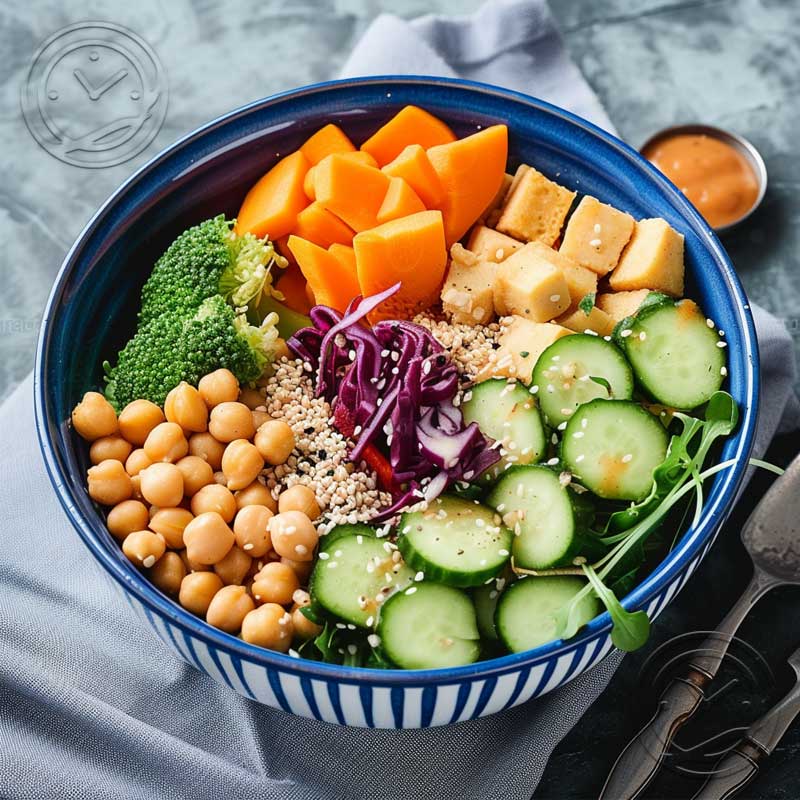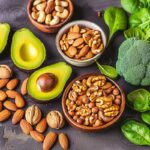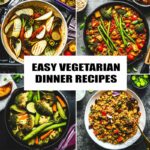Types of vegetarian diets
There are many different types of vegetarian diets, each with its own set of rules and restrictions.
The most common types of vegetarian diets include:
- Lacto-vegetarianism: This is the most common type of vegetarianism, and it involves abstaining from meat, poultry, and fish, but allows for the consumption of dairy products.
- Ovo-vegetarianism: This type of vegetarianism allows for the consumption of eggs, but not dairy products or meat, poultry, or fish.
- Veganism: This is the strictest type of vegetarianism, and it involves abstaining from all animal products, including meat, poultry, fish, dairy products, and eggs.
- Flexitarianism: This is a type of semi-vegetarianism that involves reducing meat consumption, but not necessarily eliminating it entirely.
Each type of vegetarian diet has its own unique benefits and drawbacks.
For example, lacto-vegetarianism is a good option for people who want to reduce their meat consumption but still enjoy dairy products.
Ovo-vegetarianism is a good option for people who want to avoid dairy products but still enjoy eggs.
Veganism is a good option for people who want to eliminate all animal products from their diet.
And flexitarianism is a good option for people who want to make gradual changes to their eating habits.
Ultimately, the best type of vegetarian diet for you depends on your individual needs and preferences.
If you’re thinking about adopting a vegetarian diet, talk to your doctor or a registered dietitian to learn more about the different options and to find a diet that’s right for you.
Benefits
A vegetarian diet can offer a number of health benefits, including:
- Reduced risk of heart disease: Vegetarian diets are typically lower in saturated fat and cholesterol than meat-based diets, which can help to reduce the risk of heart disease.
- Lower blood pressure: Vegetarian diets are also associated with lower blood pressure, which is another risk factor for heart disease.
- Reduced risk of obesity: Vegetarian diets are often lower in calories and fat than meat-based diets, which can help to promote weight loss and maintain a healthy weight.
- Improved blood sugar control: Vegetarian diets can help to improve blood sugar control, which is important for people with diabetes or who are at risk of developing diabetes.
- Reduced risk of some types of cancer: Vegetarian diets are associated with a reduced risk of some types of cancer, including colon cancer, prostate cancer, and breast cancer.
- Increased intake of fiber: Vegetarian diets are typically higher in fiber than meat-based diets, which can help to improve digestion and regularity.
- Increased intake of vitamins, minerals, and antioxidants: Vegetarian diets are often higher in vitamins, minerals, and antioxidants than meat-based diets, which can help to improve overall health and well-being.
It is important to note that not all vegetarian diets are healthy.
Some vegetarian diets, such as those that are high in processed foods and refined carbohydrates, can be just as unhealthy as meat-based diets.
However, a well-planned vegetarian diet can be a healthy and nutritious way to eat.
Omega-3 Fatty Acids for Vegetarians
Unlock the secrets to a healthier vegetarian lifestyle with our comprehensive guide to Omega-3 Fatty Acids. Discover the vital role…
Drawbacks
There are a few potential drawbacks to following a vegetarian diet, including:
- Potential nutrient deficiencies. A vegetarian diet can be healthy and nutritious, but it’s important to make sure you’re getting enough of all the nutrients your body needs, including protein, iron, zinc, calcium, and vitamin B12.
- Social challenges. Eating a vegetarian diet can sometimes be challenging in social situations, such as when you’re invited to a dinner party or when you’re traveling.
- Cost. A vegetarian diet can be more expensive than a diet that includes meat, especially if you’re buying organic produce and meat substitutes.
However, it’s important to note that these drawbacks are not necessarily universal.
With careful planning, it is possible to follow a healthy and nutritious vegetarian diet without experiencing any of these challenges.
How to transition to a vegetarian diet?
Transitioning to a vegetarian diet can be a great way to improve your health and the environment.
However, it can also be a challenge, especially if you’re used to eating meat.
Here are some tips to help you make the transition smoothly:
- Do your research. Learn about the different types of vegetarian diets and the benefits of each one. This will help you make an informed decision about which diet is right for you.
- Start slowly. Don’t try to go vegan overnight. Start by cutting out one or two meatless days per week. As you get used to eating less meat, you can gradually increase the number of days you go meatless.
- Find meatless alternatives. There are many delicious meatless alternatives available today, such as tofu, tempeh, seitan, and plant-based meat substitutes. Experiment with different meatless alternatives until you find ones that you enjoy.
- Make vegetarian meals at home. Eating out at vegetarian restaurants can be expensive, and it’s not always easy to find vegetarian options at non-vegetarian restaurants. Make it easy on yourself by cooking vegetarian meals at home.
- Be patient. Transitioning to a vegetarian diet can take time. Don’t get discouraged if you slip up every now and then. Just keep at it, and you’ll eventually reach your goal.
Making the switch to a vegetarian diet can be a rewarding experience.
By following these tips, you can make the transition smoothly and enjoy all the benefits of a vegetarian lifestyle.
Omega-3 Fatty Acids for Vegetarians
Unlock the secrets to a healthier vegetarian lifestyle with our comprehensive guide to Omega-3 Fatty Acids. Discover the vital role…
Foods to eat
- Fruits
- Vegetables
- Legumes
- Whole grains
- Nuts and seeds
- Plant-based milks
- Yogurt
- Cheese
- Meat substitutes
Vegetarian recipes
Here are some delicious and easy vegetarian recipes to try:
- Easy Vegan Chili: This chili is hearty and flavorful, and it’s perfect for a cold winter day.
- One-Pot Pasta with Vegetables: This dish is quick and easy to make, and it’s a great way to use up leftover vegetables.
- Tofu Scramble with Vegetables: This scramble is a great alternative to eggs, and it’s packed with protein and fiber.
- Vegan Banana Pancakes: These pancakes are fluffy and delicious, and they’re a great way to start your day.
- Easy Vegan Mac and Cheese: This mac and cheese is creamy and cheesy, and it’s a great comfort food.
Vegetarian Diet Protein Sources
Unlock the power of vegetarian protein sources for a healthy diet! Explore diverse options like beans, tofu, nuts, and quinoa,…
Vegetarian restaurants
Here is a list of vegetarian-friendly restaurants in different cities:
- New York City:
- Peacefood Cafe
- Orchard Grocer
- Terri
- Los Angeles:
- Gracias Madre
- Taïm
- Blossom Vegetarian Restaurant
- Chicago:
- The Purple Pig
- A1 Vegan Cafe
- Edzo’s Burger Shop
- San Francisco:
- Mission Chinese Food
- Nopalito
- Cha Cha Cha Vegan Cafe
Vegetarian travel
Traveling as a vegetarian can be challenging, but it is definitely possible.
Here are some tips and advice to help you make your trip a success:
- Do your research before you go. Find out what vegetarian options are available at your destination. This will help you avoid any surprises.
- Pack some snacks. This will come in handy when you’re in a pinch and can’t find anything to eat.
- Be flexible. You may not always be able to find exactly what you want to eat, so be prepared to compromise.
- Don’t be afraid to ask for help. If you’re struggling to find something to eat, don’t be afraid to ask the staff at your hotel or restaurant for suggestions.
With a little planning and preparation, you can enjoy a vegetarian-friendly vacation without any problems.





